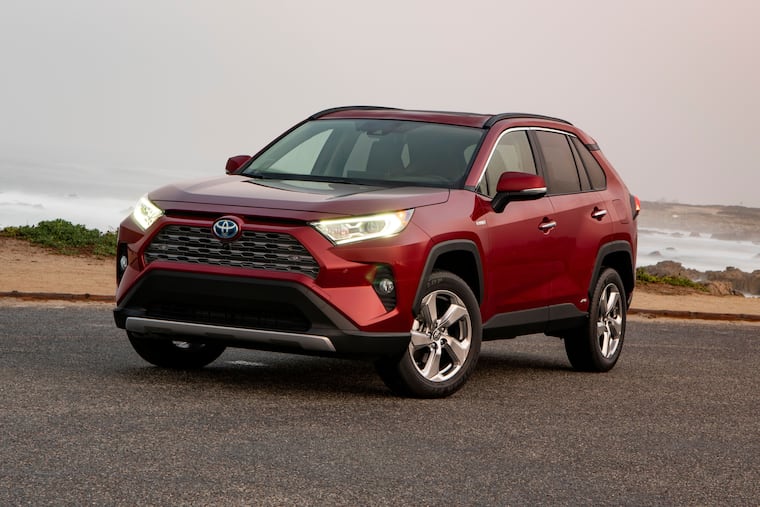At the Philly Auto Show, trucks are tops, but electrification is growing
The 119th edition of the auto show features 36 manufacturers, and highlights this year include the Land Rover Defender, Porsche Taycan, and Chevrolet Corvette.

It’s the Philly Auto Show’s opening weekend, and the return of new models, future cars, classics, and more also makes it a good time to evaluate where the industry has been and where it’s headed.
Show chair Maria Pacifico says the event’s timing this year is perfect for buyers and dealers ready to talk cars.
“It’s the unofficial start to our selling season around Presidents’ Day, so the show kicks that off,” Pacifico said.
The 119th edition of the auto show features 36 manufacturers, and highlights this year include the Land Rover Defender, Porsche Taycan, and Chevrolet Corvette.
As for sales, 2020 is expected to be a good year for maintaining the momentum of sales, which have stayed at a plateau since 2016.
Jessica Caldwell, director of Insights for the automotive website Edmunds, said company analysts expect sales to remain relatively flat. A total of 17.1 million cars were sold in 2019, down from 17.3 million in 2018.
“A bit of an X factor this year is that it’s an election year,” Caldwell said. Sales have gone up in every election year since 1964 except for 1980 and 2008, she said, both among the weakest economic years in recent history.
So where will buyers’ dollars be going?
Trucks and more trucks
Caldwell outlines the 2019 sales breakdown. Trucks made up 19% of sales and SUVs 51%, so together they total 70% of the market. An additional 25% is traditional cars, and the last 5% is full-size vans. Larger vehicles in general are drawing the strongest interest.
What about electrics and hybrids?
A small but definitely growing segment of the industry is operated by electric motors, either solely or in tandem with a gasoline engine.
This segment made up of 4.3% of sales in 2019, and Edmunds expects it to be 4.8% of 2020’s sales.
And the growth likely won’t come from exciting new vehicles, Caldwell said, but from small SUVs such as the Honda CR-V and Toyota RAV4 adding hybrid models.
“These are popular crossover compacts, the most popular segment in the United States,” Caldwell said. “The buyers tend to be more pragmatic buyers, so having something like good fuel economy will be really attractive to them.”
Pragmatic buyers may also appreciate an advance debut of a high-performance super car. Pacifico cited the new Porsche Taycan among vehicles for performance freaks, but its practicality comes from a different angle. Because it’s an 800-volt system rather than the standard 400, recharging times are radically diminished. A five-minute high-power charge can add 100 kilometers (a little over 60 miles), and a 23-minute charge can add 80% of the car’s 405-kilometer range.
Tech is a big draw
Caldwell said one headwind for car sales could be high prices — the average vehicle sold for $37,000 in 2019. But people are paying the price to get the latest infotainment technology and safety features on their vehicles.
That might sound like more of the same, but Pacifico recounted a story that showed just how much remains to be added to vehicles of the future. While visiting the Land Rover display at the Los Angeles show in the fall, she found the advances in visual aids eye-catching.
“The camera system is unbelievable,” Pacifico said about the new Land Rover Defender, on display at the Philly Auto Show. “You can effectively see through the hood.”
Fully autonomous cars, once the big story in the automotive industry, have seen development slow over the last few years. Still, pieces of the system, like adaptive cruise control and automatic emergency braking, are definitely getting people’s attention — and buyers’ money.
And advances are definitely on the way. Pacifico, owner of Pacifico Ford, Mazda, and Hyundai, couldn’t help but share a bit of a self-promotional tale of technological advances in the 2020 Hyundai Sonata.
“It parks itself and unparks itself with a button on the key,” Pacifico said. “You can actually move the car without anybody in it.”
Year of the woman?
As the first female chair of the Philly Auto Show, and someone who’s been in the industry her whole life, Pacifico sees the industry working better than ever for women, as employers and as sellers.
Pacifico remembered a meeting in 1988 where she met an executive whose first question of her was “Are you married?”
Today, the industry is far more female-friendly than it was 30 years ago, certainly to buyers. It has to be — 62% of vehicles in the United States were purchased by women in 2019, she said.
“It has been around 50% for a while,” Pacifico noted. “It felt like it didn’t move for a long time. We used to talk about women influencing decisions, so now it’s kind of cool to see them leading in actually purchasing.”